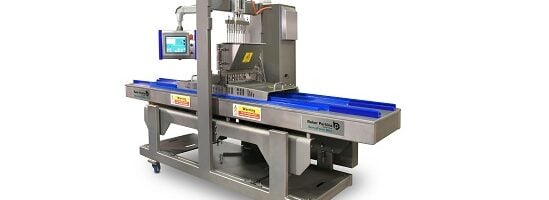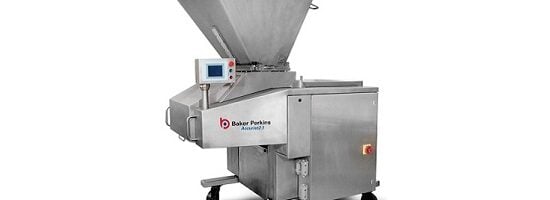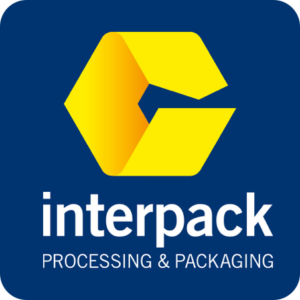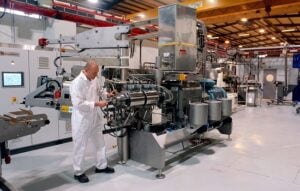
This article was originally published in the October 2019 issue of Milling and Grain magazine, and can be accessed here.
It is scarcely surprising that the range of grain based food products produced using the extrusion process continues to grow steadily. Extrusion is perhaps the most versatile process available to the food industry. It is capable of producing a wide range of end products from a variety of different ingredients and rapidly switching between them. It can replicate products made using other, less flexible, methods and the breadth of process options offers product developers plenty of scope for innovation.
Food with enhanced nutritional properties is a significant current growth area as diet awareness grows. High-quality snacks and ready-to-eat cereals form an ideal base for functional nutrition, and extrusion can be utilised to penetrate this expanding market for foods high in protein and fibre. Snacks and cereals are a convenient and palatable carrier for these beneficial products, and development work by Baker Perkins shows that any existing extruded or co-extruded product recipe can be easily augmented.
The protein market, for example, is moving rapidly beyond body building into the mainstream to meet a variety of needs, including balancing diet, satiety and weight loss. Any existing extruded or co-extruded product recipe can be easily augmented by changing the product formulation.
Proteins from wheat, dairy, soy or nuts as well as fibre can be introduced to any extruded grain-based snack in powder form; soluble fibres can be added to co-extruded products. Whole grain or multi-grain formats could also be chosen to make a positive contribution to the nutritional profile, and strengthen the ‘feel good’ factor. Cereal flakes can be fortified with vitamins, protein and fibre.
Gluten free is another category seeing rapid growth. Again, extrusion can help manufacturers respond to demand by using flours from gluten-free grains such as maize, rice, quinoa or buckwheat – and also, incidentally, provide grain-free products by using vegetables and legumes. As with protein and fibre, the adaptable extrusion process can easily accommodate gluten-free recipes.
Wholegrain products have been growing for some time. They retain, after processing, all three parts of the original grain – the germ, bran and endosperm – in their original proportions. Multigrain products feature a combination of grains such as wheat, rye, corn, barley or rice; they offer the opportunity to develop new textures with a beneficial nutritional profile.
Baker Perkins offers several product concepts based on a whole or multigrain platform. They include shredded, expanded and cracker snacks with greatly reduced levels of saturated fat, overall fat content, and salt. Grains and other ingredients that add appeal and a healthy image are the hallmark of shredded style snacks with shape and texture generated by extrusion rather than frying.
There is also a discernible trend towards more adventurous products. The capacity of extruders to add virtually any colour and flavour allows products to be tailored to recreate tastes and textures from around the world.
In addition to familiar, conventional flavours, Asian, Middle Eastern and Hispanic tastes are increasingly popular. Chilli, paprika, teriyaki, guacamole, sweet and sour, black bean sauce and a wide family of curries can be used individually or in combination to produce snacks with high consumer appeal.
Snacks and ready-to-eat cereals
The snack and ready-to-eat cereal sectors are intensive users of extrusion systems, and representative of the capability and adaptability of the extrusion process and the opportunities it creates.
Companies can enter the market with an uncomplicated system, usually consisting of an extruder, dryer and flavouring system, making standard, direct expanded curls, balls, rings and chipsticks with rapid changeover between runs of different products. As a business grows, or consumer tastes change, a Baker Perkins line may be extended to broaden or even completely change the range of products being made.
Companies that wish to expand their product offering beyond direct expansion often opt for co-extrusion. The co-extrusion die produces continuous cereal tubes filled with a savoury or sweet paste or cream. The tubes can be formed into a variety of formats including mini, bite-size or hand-held pieces in pillow, stick, bar or wafer shapes.
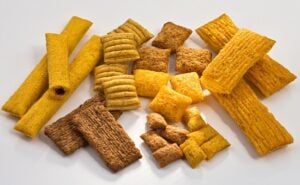
Fillings can be of virtually any colour or flavour – sweet and savoury creams, fruit pastes, cheese and chocolate praline are typical. Exotic flavours, plus glazings, frostings or chocolate coating, add even more appeal. The outer shell can appear to be plain or stringy, with surface textures such as grooves and highlights.
Extruding complete and part products
A rapidly growing business is the extrusion of ingredients and inclusions for the food industry. Typical examples include soy or grain crispy pieces that add texture and functionality to bars and dairy products; modified flours and starches that act as clean-label thickeners and emulsifiers for soups, sauces, desserts and beverages; and standard or gluten-free breadcrumb and croutons.
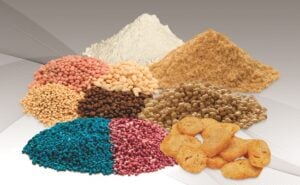
Compared with traditional processes, extrusion can bring significant savings in space, equipment, energy and labour. Breadcrumb is a typical example. The traditional process involves mixing, forming and baking bread before discarding the crusts and grinding. The same product can be made without waste – with gluten, or gluten-free – using only a twin-screw extruder and dryer.
Similarly for soup and salad croutons; a bread-like texture can be developed in the extruder and the pieces cut to size at the die or a post-extrusion cutter.
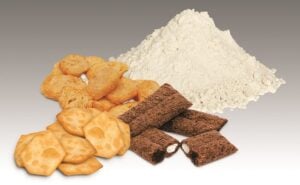
Extrusion is also an excellent way of addressing the market for gluten-free bread products as it can handle with ease the various alternative flours and starches used to make the dough.
As an aside, new opportunities regularly appear for extrusion, not always in the food industry. One recent out-of-the-ordinary application proven in a Baker Perkins extruder replaces foam pellets used for packaging with extruded starch pellets – which have the great virtue of being biodegradable.
A new generation of extruder
A new generation of extrusion equipment for the food industry has been introduced by Baker Perkins. The SBX Master twin-screw extruder range for cereal, snacks, ingredients and other food applications has been re-designed and a new pre-conditioner added to the range to increase flexibility.
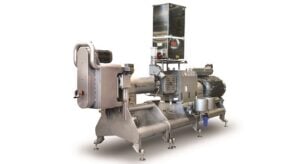
The flexibility of the SBX Master extruder has been improved by increasing power, torque and speed. This, along with a range of barrel lengths, increases the variety of end products that can be made while barrel diameters between 50mm and 125mm give an output range from 500 to 2,300kg/hr.
Improved cooling also contributes to broadening the range of products that can be made, and additionally improves quality and consistency. The new design features water distribution channels for cooling located closer to the internal surface of the barrel to improve both responsiveness and the rate of heat transfer. Flow rate is increased, and cooling can be controlled and adjusted to individual product profile.
The SBX Master is now a totally modular machine, so future extension of the barrel and all the associated services to expand or change a product portfolio is speedy and straightforward.
The arrangements for mounting the die and cutter have been simplified to make changeover, cleaning and maintenance faster and safer. The die is supported on a hinged arm that enables it to be moved quickly and safely, especially when hot, while the cutter slides in and out of position on rails. This is a pneumatically-powered, pushbutton-operated system that automatically puts the cutter directly in front of the die as soon as the extruder is ready, leaving only fine adjustment to the operator. This minimises time and waste generated during set-up, changeover or, if a blade change is required, during a run.
A gearbox condition monitoring system that reduces unexpected downtime is available on all new SBX extruders and can also be fitted to existing machines. This simple system continuously monitors the frequency and amplitude of vibrations within the gearbox, allowing the ongoing condition of vital components to be measured.
The principal benefit is elimination of unforeseen loss of production due to gearbox repair or replacement: maintenance scheduling is significantly enhanced.
The preconditioner is a new addition to the Baker Perkins SBX Master range that increases flexibility and throughput, especially when applied to denser and/or shear-sensitive materials. It is particularly advantageous when processing pellets for flaked cereals, pet products, and half-products formed in the extruder and expanded elsewhere – flaked cereals and multi-grain loops are typical. It is also ideal for protein products where energy input in the preconditioner replaces mechanical shear energy in the extruder in order to avoid protein damage.
Innovation centre
A key advantage of working with Baker Perkins is the Innovation Centre at Peterborough in the UK, with facilities to develop new products and processes, produce samples for test marketing, and conduct feasibility trials.
Companies from every part of the world find that thorough trials, often using their own raw materials, provide a reliable basis for trouble-free commissioning of a new plant or launch of a new line. The wide variety of process technologies available under one roof enables Baker Perkins to cross conventional process boundaries, and to offer a variety of process solutions for a single product.
The Centre contains a wide range of production and laboratory scale equipment dedicated to the snack industry.




